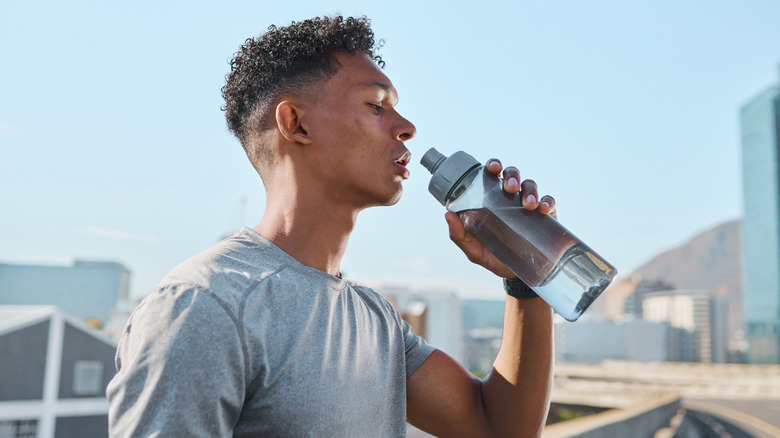Common Medications Can Make You Dangerously Vulnerable To Sun And Heat On Your Summer Vacation
Before you plan your summer vacation, you may want to think about what medications you're taking. Some of them can make you more vulnerable to heat and sun exposure. If you take these medications daily, you might want to pick a destination with plenty of shade and cooler temperatures. Check any prescription bottles for warnings about sun and heat exposure, and ask your pharmacist if you're unsure. According to the Centers for Disease Control (CDC), medications like diuretics — which reduce fluid in the body and are often taken for issues like high blood, heart failure, or kidney disease — can dehydrate you and upset your electrolyte balance, making it hard to regulate your body temperature. (These are also available over the counter for issues like premenstrual bloating.)
Another medication group, angiotensin-converting enzyme inhibitors (ACE) inhibitors — usedfor high blood pressure — can reduce your sense of thirst, so you may not think to drink as much as you need, increasing your risk of fainting. Calcium channel blockers can upset your electrolyte balance. Beta blockers can reduce your ability to sweat, which also raises fainting risk. Amphetamines, often prescribed conditions like ADHD, can raise your body temperature. Some antidepressants can increase sweating and reduce thirst, while some antipsychotics can reduce sweating.
Thyroid replacement medication can make you sweat more and raise your temperature. Even over-the-counter medications like Benadryl, or Unisom can reduce sweating. Additionally, the U.S. Food and Drug Administration (FDA) states that medications like some antibiotics, antifungals, antihistamines, oral contraceptives, estrogens, retinoids, and pain relievers like ibuprofen, naproxen, and ketoprofen can make you more sensitive to the sun — and that is only a partial list.
How to handle your summer vacation if you're taking medication that is affected by heat and sun
If you're taking these or other medications, you should know the signs of heat exhaustion and heat stroke, and the best ways to prevent them. According to the CDC, the symptoms of heat exhaustion include headache, nausea, dizziness, weakness, irritability, thirst, heavy sweating, elevated body temperature, and decreased urine output. If this occurs, get out of the hot area, remove any excess clothing (like shoes and socks) use cold compresses, sip water, and seek aid. Symptoms of heat stroke include confusion, slurred speech, altered mental state, loss of consciousness, hot, dry skin, or excessive sweating, seizures, and high body temperature. Call 911 immediately, get to a cool area, wet the skin, and put ice or wet cloths on the head, in the armpits, neck, and groin.
So what do you do in terms of vacation planning? First, avoid visiting places like Death Valley National Park, and other destinations with intense heat. While it's an extreme example, it's worth checking the average summer temperature before you book tickets. Consider whether your destination is an urban heat island, where there's more concrete, roads, and buildings, and few green spaces, and save that for a cooler time of year. Take precautions no matter where you go by planning breaks in places with air conditioning like museums and movie theaters, and bring plenty of water or sports drinks with electrolytes. Know the signs of heat stroke, and if you feel off, stop and take a rest. If your medication makes you more vulnerable to sun exposure, reapply sunscreen frequently, and go out in the early morning or late afternoon and evening when the sun isn't as direct.

